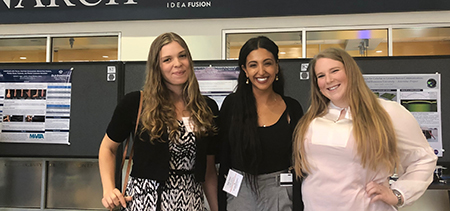
Individuals with an ACL Reconstruction Have Altered Neuromotor Function
College
College of Health Sciences
Program
Ph.D. Kinesiology & Rehabilitation
Publication Date
3-28-2019
Abstract
The anterior cruciate ligament (ACL) is a key structural component in stabilizing the knee joint during purposeful movement. However, damage and subsequent ACL reconstruction does not always often result in a return to normal function. Indeed, wide spread motor problems can emerge as a result of the absence of a natural ACL. For example, individuals with a reconstructed ACL often exhibit increased variability and irregularity coupled with changes in coordination during gait. What has not been assessed to date is whether ACL damage also leads to slowing of responses under postural conditions. The current study was designed to compare differences in reaction time under both seated and postural (i.e. standing) conditions. It was also of interest to examine how ACL reconstructed individuals responded under the more challenging postural task. Fifteen adults with unilateral ACL reconstruction and 15 age-matched healthy controls participated in this study. Baseline assessment of neuromotor function including measures of proprioception, balance, strength, and walking ability were performed. Simple and choice reaction time response were assessed under seated (i.e. control) conditions and during a postural stepping task. The results revealed similarities between both groups with regards to the baseline measures of proprioception, balance, strength, and gait as well as the seated reaction time tasks. However, during the postural stepping task, individuals with ACL reconstruction had significantly slower reaction times compared to the healthy controls. This finding indicates that these persons had a reduced ability to respond quickly under more challenging postural conditions. This finding of slower responses when stepping for the ACL reconstructed adults may be a compensatory response to the previous injury and/or residual symptoms post-ACL reconstruction. Overall, these findings indicate that reconstruction of the ACL ligament impacts neural mechanisms, altering individuals’ ability to respond under challenging balance tasks.
Files
Recommended Citation
Armitano, Cortney; Morrison, Steven; and Russell, Daniel, "Individuals with an ACL Reconstruction Have Altered Neuromotor Function" (2019). College of Health Sciences Posters. 3.
https://digitalcommons.odu.edu/health_sciences/3



